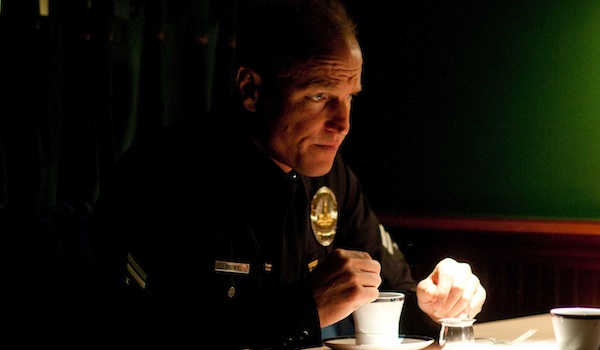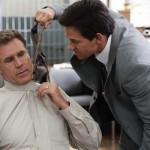Rampart Review
Rampart is another in a long line of 2011 character studies focusing on a man or woman on his or her her way to hitting rock bottom. Drive did something similar, as did Martha Marcy May Marlene. Perhaps the most apt companion piece would be We Need to Talk About Kevin. Disregarding the specifics of their respective situations, it seems conceivable that Dave “Date Rape” Brown would become an Eva Khatchadourian if Oren Moverman’s film went on for another 30 minutes. Either that or he’d wind up dead. Regardless, what we get here is A+ work from Woody Harrelson. And though the film is only a B+, it’s such an electric performance you’ll have a hard time looking away.
The film is centered around the real-life Rampart scandal in which a number of LAPD officers were accused of misconduct. Brown is one of the force’s most old-fashioned officers, and his form of justice often entails actions that most of us would deem unacceptable. He unknowingly becomes the face of the Rampart scandal when a video of him mercilessly beating a black man who crashes into his patrol car goes viral. He’s formally reprimanded, and concerns over previous allegations (that he murdered a suspected rapist, hence the monicker “Date Rape Dave”) resurface. In other words, he’s in deep shit. And his increasing paranoia over work spills into his personal life when he soils his previously cordial relationship with his two daughters and their mothers (Cynthia Nixon and Anne Heche). As an escape he begins an affair with a lawyer (Robin Wright) and seeks solace in the arms of a former mentor (Ned Beatty), but Dave just can’t shake the feeling that someone is setting him up for a big fall.
It shouldn’t come as much of a surprise that Rampart‘s plot is minimal. Everything that happens is, for better or worse, a result of Dave’s actions or character. He gets himself tangled in a very complicated web of lies, abuse, cruelty, and emotional distance, and on several occasions, he’s forced to make a choice. One option always involves him coming clean or stepping away from the things that cause his destructive behavior (women, alcohol, his job). The other is the option he usually chooses. It’s the dirty option—the one that always seems to offer a quick fix to a problem but ultimately puts him in an even stickier situation.
These tendencies make the fact that the film ends without clear resolution almost a moot point. We already know where Dave’s journey will take him. The only questions are how and when he’ll get there, and Moverman (along with co-writer James Ellroy) answers us loudly and clearly. How? On his own accord. And when? Very soon.
As interesting as this trajectory is, the real reason to see Rampart is the phenomenal work by Woody Harrelson. Anyone who views this guy as a classic Hollywood stoner needs to open his or her eyes because, between his work here and what he did in Moverman’s debut, 2009’s The Messenger, he’s become a force to be reckoned with on the indie circuit. For much of the film, Dave is a quietly intense individual, but those scenes in which his true self comes to the forefront are genuinely frightening. It’s seems unclear if he’s capable of experiencing emotions like regret and fear, but as the film goes on, he develops into much more than just another Bad Lieutenant. I fear this film might be too small for a real Oscar campaign, but Harrelson would be quite deserving of the attention. He gives easily one of the year’s strongest performances, male or female.
The supporting cast of Rampart is star-studded, but make no mistake, this is Harrelson’s show. Sigourney Weaver, Ice Cube, Steve Buscemi, Anne Heche, and Cynthia Nixon all give glorified cameos. Robin Wright has a little more to do in a very intriguing, though perhaps not fully developed, role as Dave’s mistress. And Ben Foster, the other star of The Messenger, is barely recognizable as a paraplegic homeless man who informs for Dave.
There are some very interesting themes running through Rampart. It has a few things to say about the difficulties veterans have assimilating after war, as well as how hard it is for some men to change with the times. Ultimately, though, the takeaway is the character of Dave. He’s fascinating, and while his film isn’t always, it’s works far more often than it doesn’t.
















